The Carnivore Diet is a high-fat, low-carbohydrate diet that emphasises animal foods such as meat, fish, and eggs, while eliminating plant-based foods. While the diet may seem restrictive, it has gained popularity for its potential health benefits, including weight loss, improved blood sugar control, and reduced inflammation.
Cheese is a popular food that many people enjoy, but is it allowed on the Carnivore Diet? The answer is yes, as cheese is mainly composed of animal components. But this isn’t without controversy. Some people believe that incorporating cheese is against the original proponents of the diet. This revolves around two primary concerns: its carbohydrate content and potential allergenic properties.
So while cheese is a great source of protein and fat, as well as important vitamins and minerals such as calcium and Vitamin K2, not all cheese varieties are created equal. If you’re on the Carnivore Diet, you must choose your cheese wisely.
Factors to consider include carbohydrate content, the source of the milk used to make the cheese, and any potential sensitivities or allergies. You should also avoid any processed cheese altogether.
In this article, we’ll take a closer look at the role of cheese in a Carnivore Diet, the best cheese varieties for the diet, and potential health benefits and risks associated with consuming cheese.
KEY TAKEAWAYS
- Cheese is allowed on the Carnivore Diet as it consists mainly of animal components and is a great source of protein and fat.
- Hard and aged cheeses such as Parmesan, cheddar, and cream cheese are among the best cheese varieties for the Carnivore Diet.
- For those looking to stay in ketosis, always check the macronutrient breakdown of your cheese first.
- Cheese can also be high in calories, so those who are trying to lose weight should consume it in moderation.
Understanding the Carnivore Diet
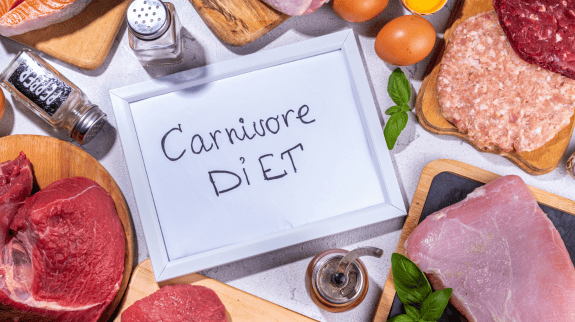
The Carnivore Diet is a high-fat, low-carb, and moderate-to-high protein diet that involves consuming only animal products. This means that individuals following this diet consume beef, pork, fish, and other animal products while avoiding all plant-based foods. The diet is based on the idea that humans evolved to eat a primarily animal-based diet and that eating a plant-based diet can be harmful to health.
The Carnivore Diet is often used for weight loss, improved digestion, and increased energy levels. It is also believed to have potential benefits for individuals with autoimmune disorders, as it eliminates potentially inflammatory foods from the diet.
One of the key principles of the Carnivore Diet is consuming animal products that are high in fat. This is because fat is a key source of energy on the diet and helps keep individuals feeling full and satisfied. Some of the best sources of fat on the Carnivore Diet include fatty cuts of beef, pork, and fish, as well as eggs and dairy products.
Also read: How to get enough fat on the carnivore diet
Animal products are also an excellent source of protein, which is important for building and repairing muscle tissue. The high protein content of the Carnivore Diet can help individuals maintain muscle mass while losing weight.
Overall, the Carnivore Diet is a unique approach to nutrition that involves consuming only animal products. While it can be effective for weight loss and other health benefits, it is important to consult with a healthcare provider before starting the diet to ensure that it is safe and appropriate for individual needs.
Role of Cheese in a Carnivore Diet
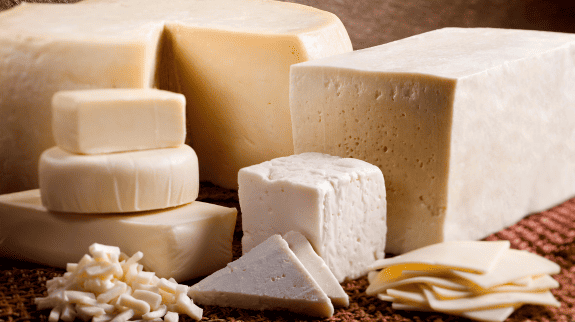
Cheese is a dairy product that is made from milk. It is a high-quality source of protein and healthy fats. Cheese is also rich in calcium, vitamins, and minerals that are beneficial to the body. However, cheese also contains carbs and lactose, which should be consumed in moderation on a carnivore diet.
Cheese is a popular food item among people who follow a carnivore diet due to its high-fat content. It is also a great source of protein, which is essential for weight loss and muscle gain.
It can be easy to digest and provides several health benefits including beneficial bacteria that aids in digestion and improve gut health. Cheese is also rich in nutrients that are essential for the body, such as calcium, zinc, and vitamin D. These nutrients help improve heart health, lower blood pressure, and reduce inflammation.
Cheese is also a good source of conjugated linoleic acid (CLA), which has been shown to reduce the risk of cancer and improve satiety.
Also read: Best supplements for the carnivore diet 2023
Overall, cheese can be a healthy addition to a carnivore diet when consumed in moderation. It is important to choose high-quality cheese that is made from milk from grass-fed cows and does not contain additives or preservatives. It should also be consumed in moderation to avoid weight gain and other digestive issues.
Best Cheese Varieties for Carnivore Diet
When it comes to the carnivore diet, not all cheese is created equal. Some varieties are higher in carbohydrates than others, which can make it difficult to stay in ketosis.
Some of the best cheese varieties for the carnivore diet include those that are hard or aged. Cheeses such as Parmesan, Cheddar, Gouda, Cream cheese, and Aged cheeses like Manchego, Gorgonzola, and Roquefort
Soft Cheeses and Blue cheese should also be avoided for those on the diet due to their high lactose content.
Parmesan Cheese
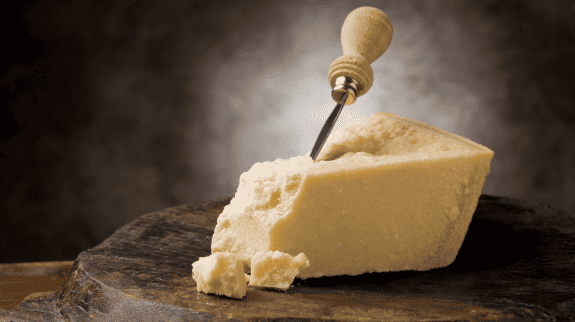
Parmesan cheese is low in carbohydrates and high in protein, making it a great source of energy. It also has a sharp, nutty flavor that adds depth to dishes without too many carbs or calories.
It’s worth noting that while Parmesan cheese is rich in protein and fat, it also packs in essential micronutrients like calcium, phosphorus, and vitamin A, which contribute to bone health and various physiological functions.
Cheddar Cheese
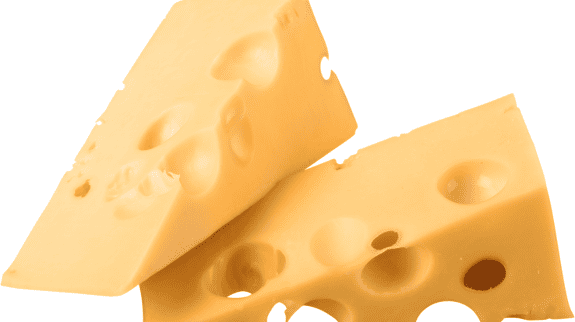
Cheddar cheese is another great option for the carnivore diet to include in your meal planning. Cheddar cheese has very minimal carbohydrates, usually less than 1 gram per 1-ounce serving.
Gouda Cheese
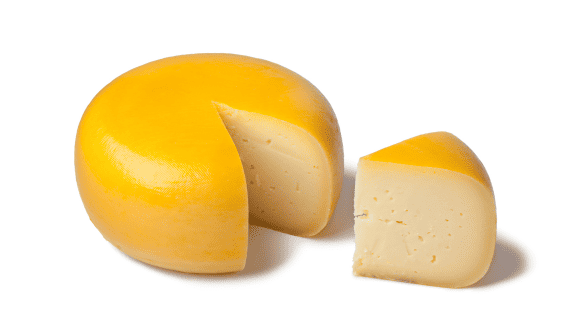
Gouda cheese is a semi-hard cheese that is low in carbohydrates and high in fat. It has a mild, nutty flavor that can add a lot of depth to dishes without too many carbs or calories.
Cottage Cheese
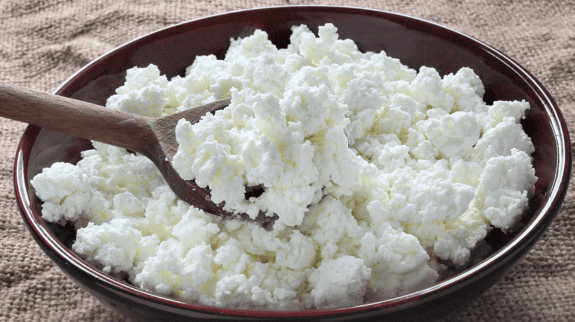
Cottage cheese is a nutritious and protein-rich option for those who tolerate dairy well. It is a fresh cheese curd product with a mild flavor that can be a pleasant change in the carnivore diet. Its creamy consistency works well as a dip for meaty snacks or as a base for a dessert, combined with a bit of vanilla extract.
Cream Cheese
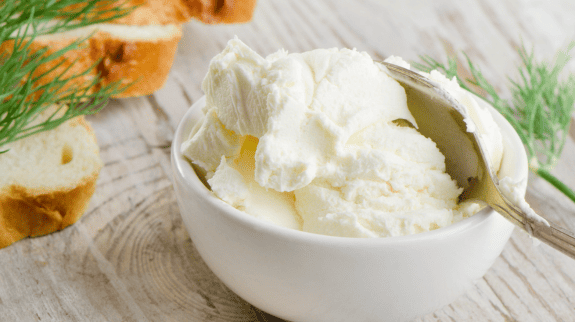
Cream cheese is generally also an acceptable option for those on the carnivore diet as long as it does not contain any added sugars or other undesirable ingredients.
Aged Cheeses
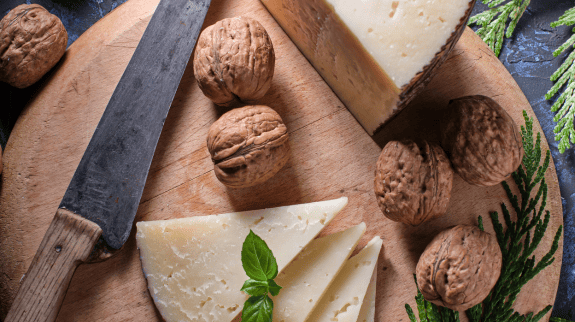
Aged cheeses like Manchego, Gorgonzola, and Roquefort are higher in fat and lower in carbohydrates than younger cheeses. They have a strong, pungent flavor that can add a lot of depth to dishes.
Overall, there are many great cheese options for those on the carnivore diet. When choosing a cheese, it is important to look for varieties that are low in carbohydrates and high in fat and protein.
Factors to Consider When Choosing Cheese
When choosing cheese for a carnivore diet, there are several factors to consider. These factors include taste, flavors, high-quality, grass-fed, additives, preservatives, organic, antibiotics, and hormones.
Macronutrient breakdown
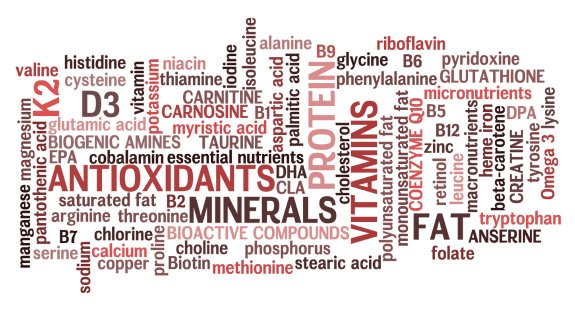
For those looking to stay in ketosis, macronutrients can make all the difference.
Below is a table showing the approximate macronutrient ranges for some popular cheeses. Please note that the values are approximate and can vary based on different brands and varieties of cheese.
| Cheese Type | Protein (per 1 oz) | Fat (per 1 oz) | Carbohydrates (per 1 oz) | Calories (per 1 oz) |
|---|---|---|---|---|
| Cheddar | 6-7g | 9-10g | 0-1g | 110-115 |
| Mozzarella | 6-7g | 5-6g | 0-1g | 70-85 |
| Swiss | 7-8g | 7-9g | 0-1g | 100-120 |
| Parmesan | 9-10g | 7-8g | 0-1g | 110-120 |
| Brie | 5-6g | 8-9g | 0-1g | 95-105 |
| Feta | 4-5g | 6-7g | 1-2g | 70-80 |
| Blue Cheese | 5-6g | 8-9g | 0-1g | 100-110 |
| Gouda | 6-7g | 8-9g | 0-1g | 100-110 |
| Cottage Cheese | 10-15g | 0-5g | 3-5g | 70-110 |
| Ricotta | 5-6g | 4-5g | 1-2g | 60-80 |
High-Quality and Grass-Fed
High-quality and grass-fed cheese is the best choice for a carnivore diet. Grass-fed cheese is made from cows that are allowed to graze on grass, which results in a higher quality of milk and cheese. This type of cheese is also higher in nutrients such as omega-3 fatty acids, vitamins, and minerals.
Additives and Preservatives
Additives and preservatives are often added to cheese to enhance its flavor and extend its shelf life. However, these additives can be harmful to health and should be avoided. It is important to choose cheese that is free from additives and preservatives.
Organic
Organic cheese is made from milk that is free from antibiotics and hormones. It is also free from synthetic fertilizers and pesticides. Organic cheese is a healthier option and is better for the environment.
Antibiotics and Hormones
Cheese made from milk that is free from antibiotics and hormones is the best choice for a carnivore diet. Antibiotics and hormones can be harmful to health and can also affect the quality of milk and cheese.
Potential Health Benefits and Risks
The Carnivore Diet, which mainly consists of animal products, has both potential health benefits and risks. Here are some of them:
Health Benefits

Nutrient-Dense
Animal products are rich in essential nutrients such as protein, vitamins, and minerals. Cheese, in particular, is a good source of calcium, which is essential for bone health. Some types of cheese, such as cheddar, also contain vitamin K2, which is important for heart health.
Satiety
Cheese is high in fat and protein, which can help people feel full and satisfied after eating. This can potentially lead to weight loss by reducing overall calorie intake.
Heart Health
Studies have shown that consuming cheese in moderation may reduce the risk of heart disease. Cheese contains conjugated linoleic acid (CLA), which has been linked to lower blood pressure and reduced inflammation.(1)
Risks
Inflammatory
Some people may experience inflammation when consuming dairy products, including cheese. This can lead to digestive issues such as constipation.
Weight Gain
Cheese is high in calories and fat, which can contribute to weight gain if consumed in excess. People on the Carnivore Diet may need to monitor their cheese intake to avoid overeating.
Linoleic Acid
Cheese contains linoleic acid, which is an omega-6 fatty acid. Consuming too much omega-6 fatty acids can potentially lead to inflammation and increase the risk of chronic diseases such as diabetes and obesity.
Conclusion
In conclusion, cheese can be a beneficial addition to a carnivore diet if consumed in moderation. Cheese is a dairy product that is high in protein, healthy fats, calcium, vitamins, and minerals. It can provide satiety and aid in weight loss, digestion, and heart health.
However, it is important to choose high-quality cheese that is grass-fed and low in carbohydrates. Cheese that is high in fat and protein can be beneficial for the body, but cheese with additives and preservatives can be inflammatory and harmful.
Individuals with lactose intolerance or dairy allergies should avoid cheese or try eliminating it from their diet to see if it improves their symptoms. Cheese can also be high in calories, so those who are trying to lose weight should consume it in moderation.
Overall, cheese can be a nutritious and beneficial addition to a carnivore diet when consumed in moderation and chosen carefully. It can provide beneficial bacteria, protein, and healthy fats, but it is important to choose high-quality, grass-fed, and organic options to avoid antibiotics and hormones. Cheese can be a part of a healthy and nutrient-dense diet when consumed in moderation and as part of a balanced meal plan.
Frequently Asked Questions
Is there a limit to how much cheese I can eat on the carnivore diet?
While cheese is allowed on the carnivore diet, it is recommended to consume it in moderation. Cheese is high in calories and fat, so overconsumption may lead to weight gain. Additionally, some people may experience digestive issues if they eat too much cheese.
What types of cheese are recommended for the carnivore diet?
Hard cheeses like cheddar, parmesan, and gouda are generally considered to be the best options for the carnivore diet. These cheeses are low in lactose and carbs and high in fat and protein.
Can shredded cheese be consumed on the carnivore diet?
Shredded cheese is allowed on the carnivore diet as long as it is not mixed with any other ingredients or additives. Some shredded cheeses may contain anti-caking agents or other additives, so it is important to read the label carefully before consuming.
What are some dairy options other than cheese for the carnivore diet?
If you are looking for dairy options other than cheese on the carnivore diet, you can try heavy cream, butter, and ghee. These options are high in fat and low in carbs and may be easier to digest than cheese.
Are there any cheeses that should be avoided on the carnivore diet?
Soft cheeses like brie and camembert are higher in lactose and carbs and may not be suitable for the carnivore diet. Additionally, processed cheese products like cheese slices and cheese spreads may contain additives and preservatives that are not allowed on the carnivore diet.
What is the consensus on consuming cheese while on the carnivore diet?
While some people on the carnivore diet choose to consume cheese, others believe that it is not a necessary part of the diet. Ultimately, the decision to consume cheese while on the carnivore diet is a personal one and should be based on individual dietary needs and preferences.

